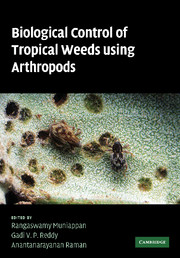Book contents
- Frontmatter
- Contents
- List of contributors
- Acknowledgments
- 1 Biological control of weeds in the tropics and sustainability
- 2 Acacia nilotica ssp. indica (L.) Willd. ex Del. (Mimosaceae)
- 3 Australian Acacia species (Mimosaceae) in South Africa
- 4 Ageratina adenophora (Sprengel) King and Robinson (Asteraceae)
- 5 Azolla filiculoides Lamarck (Azollaceae)
- 6 Cabomba caroliniana Gray (Cabombaceae)
- 7 Invasive cactus species (Cactaceae)
- 8 Chromolaena odorata (L.) King and Robinson (Asteraceae)
- 9 Clidemia hirta (L.) D. Don (Melastomataceae)
- 10 Coccinia grandis (L.) Voigt (Cucurbitaceae)
- 11 Eichhornia crassipes (Mart.) Solms–Laub. (Pontederiaceae)
- 12 Lantana camara Linn. (Verbenaceae)
- 13 Mimosa diplotricha C. Wright ex Sauvalle (Mimosaceae)
- 14 Mimosa pigra L. (Leguminosae)
- 15 Parthenium hysterophorus L. (Asteraceae)
- 16 Passiflora mollissima (HBK) Bailey (Passifloraceae)
- 17 Pistia stratiotes L. (Araceae)
- 18 Prosopis species (Leguminosae)
- 19 Salvinia molesta D. S. Mitchell (Salviniaceae)
- 20 Solanum mauritianum Scopoli (Solanaceae)
- 21 Application of natural antagonists including arthropods to resist weedy Striga (Oranbanchaceae) in tropical agroecosystems
- 22 Biological control of weeds in India
- 23 The role of International Institute of Tropical Agriculture in biological control of weeds
- 24 The role of Secretariat of the Pacific Community in the biological control of weeds in the Pacific Islands region – past, present, and future activities
- Index
23 - The role of International Institute of Tropical Agriculture in biological control of weeds
Published online by Cambridge University Press: 04 August 2010
- Frontmatter
- Contents
- List of contributors
- Acknowledgments
- 1 Biological control of weeds in the tropics and sustainability
- 2 Acacia nilotica ssp. indica (L.) Willd. ex Del. (Mimosaceae)
- 3 Australian Acacia species (Mimosaceae) in South Africa
- 4 Ageratina adenophora (Sprengel) King and Robinson (Asteraceae)
- 5 Azolla filiculoides Lamarck (Azollaceae)
- 6 Cabomba caroliniana Gray (Cabombaceae)
- 7 Invasive cactus species (Cactaceae)
- 8 Chromolaena odorata (L.) King and Robinson (Asteraceae)
- 9 Clidemia hirta (L.) D. Don (Melastomataceae)
- 10 Coccinia grandis (L.) Voigt (Cucurbitaceae)
- 11 Eichhornia crassipes (Mart.) Solms–Laub. (Pontederiaceae)
- 12 Lantana camara Linn. (Verbenaceae)
- 13 Mimosa diplotricha C. Wright ex Sauvalle (Mimosaceae)
- 14 Mimosa pigra L. (Leguminosae)
- 15 Parthenium hysterophorus L. (Asteraceae)
- 16 Passiflora mollissima (HBK) Bailey (Passifloraceae)
- 17 Pistia stratiotes L. (Araceae)
- 18 Prosopis species (Leguminosae)
- 19 Salvinia molesta D. S. Mitchell (Salviniaceae)
- 20 Solanum mauritianum Scopoli (Solanaceae)
- 21 Application of natural antagonists including arthropods to resist weedy Striga (Oranbanchaceae) in tropical agroecosystems
- 22 Biological control of weeds in India
- 23 The role of International Institute of Tropical Agriculture in biological control of weeds
- 24 The role of Secretariat of the Pacific Community in the biological control of weeds in the Pacific Islands region – past, present, and future activities
- Index
Summary
International Institute of Tropical Agriculture (I ITA)
IITA is one of Africa's leading research organizations in finding solutions for the devastating social issues of hunger and poverty. IITA was established in 1967 with a mission to enhance food security and improve livelihoods for the people of Africa through research for development. Operating from a number of stations across sub-Saharan Africa, its scientists work towards the development of technologies that reduce risk for producers and consumers, increase local production and wealth generation. It is the largest among several agricultural research centers across the world, supported by the Consultative Group on International Agricultural Research (CGIAR). IITA recognizes the agricultural sector as a vital element to sub-Saharan Africa's economic development employing nearly two-thirds of its population. IITA also recognizes that agriculture is a complex network of skills and expertise which includes the conception of an idea for a specific agricultural product until it nourishes a satisfied customer. This process may be as different as a farmer knowing when to plant a cassava crop to be able to prepare a nutritious family meal following a bountiful harvest, to the investment in the infrastructure and organization needed for African cocoa to be marketed throughout the world for the benefit of consumers who are willing to pay a premium for luxury products.
Agriculture covers a multiplicity of stakeholders and systems, which lead from the “soil to supper.”
- Type
- Chapter
- Information
- Biological Control of Tropical Weeds Using Arthropods , pp. 453 - 464Publisher: Cambridge University PressPrint publication year: 2009
- 1
- Cited by



